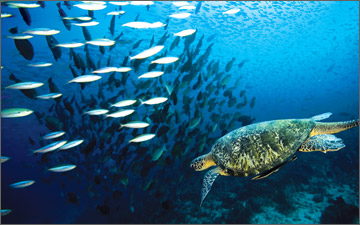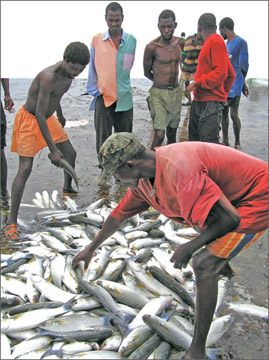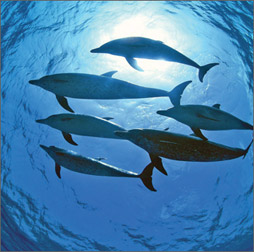|
World Oceans Day on Wednesday :
An ocean of opportunities to save the high seas
By Pramod DE SILVA
 There are those who say that our Planet Earth should have been named
Planet Ocean instead. They do have a valid point. Water covers more than
75 percent of the Earth. If an alien were to look at Earth from a
distance, the oceans will figure prominently. That is why some prefer to
call it the Blue Planet. There are those who say that our Planet Earth should have been named
Planet Ocean instead. They do have a valid point. Water covers more than
75 percent of the Earth. If an alien were to look at Earth from a
distance, the oceans will figure prominently. That is why some prefer to
call it the Blue Planet.
Living in an island, we are no strangers to the sea. It is never more
than 100 Km away from most places in the country. We have a
life-affirming relationship with the sea, which is called the Indian
Ocean in these parts. Although we have given various names to oceans and
seas geographically, it is one continuous body of water.
We think we know the sea, but we do not. It is one vast mystery we
are yet to unravel fully. In fact, scientists know more about the
surface of the moon than they know about the depths of the seas. Space
is often called the final frontier, but we are yet to explore the
oceanic frontier right at home. New discoveries - new species, new
structures and new natural phenomena - are made every day from the
depths of the oceans.
It will take thousands more years to fully understand and explore the
oceans, but a start has to be made somewhere. And the World Oceans Day,
which falls on June 8, is the best day to focus on the importance of our
oceans and to take action on critical issues affecting the oceans.
 Although unofficially celebrated for years, the United Nations
officially declared in 2009 that World Oceans Day would be held on June
8 each year. Although unofficially celebrated for years, the United Nations
officially declared in 2009 that World Oceans Day would be held on June
8 each year.
The day helps raise awareness on the problems faced by our oceans and
compel governments and individuals to take steps to protect them.
In 2003, the Pew Oceans Commission warned that the world's oceans are
in a state of "silent collapse," threatening our food supply, marine
economies, recreation and the natural legacy we leave our children.
Every year, the World Oceans Day is celebrated under a different
theme. This year's theme (which will be carried over to the next year as
well) is Youth: The Next Wave for Change. The youth, especially those in
coastal communities, are the best agents to spread the message on the
importance of protecting the oceans because they have a close affinity
to the sea.
Primordial life
Why should we strive to protect the oceans? A short answer is that
they give us life. Oceans are where life forms first appeared on Earth
billions of years ago. In fact, we carry a bit of the sea in our very
bodies in a sort of homage to primordial life - our cellular make-up is
very similar to the chemical composition of sea water. Thus, we are
never far from the sea in a figurative sense.
Did you know that oceans generate most of the oxygen we breathe? The
oceans are home to phytoplankton, which release oxygen during the
process of photosynthesis, the conversion of sunlight to energy. It is
this oxygen which literally gives life to organisms in and off the seas.
This role played by oceans is vital to the circle of life on Earth.
Oceans thus help to regulate our climate as well.
Oceans are also a source of food to billions of people. As islanders,
we are familiar with all types of seafood. Thanks to modern freezing and
canning techniques, people even in landlocked countries can have access
to fresh seafood. Through this industry, around 500 million people
worldwide depend on the sea for a living directly and indirectly.
The worldwide per capita consumption of fish is nearly 20 Kg
annually. Around 90 million tonnes of fish are harvested annually from
the world's seas, excluding the catch from fish farms in coastal areas.
The harvesting of aquatic plants (seaweed etc) is a lesser known, but
growing industry.
How long can this go on? Some fish species may face extinction if
fishing goes on at the current rates. Scientists estimate that we have
removed as much as 90 percent of the large predatory fish such as shark,
swordfish and cod from the world's oceans. The global catch of wild fish
levelled off over 20 years ago and 70 percent of the world's fisheries
are being harvested at capacity or are in decline.
Sustainable fishing
 This is where sustainable fishing comes in. The 'catch' here is that
fisheries resources are managed in a way that does not endanger any
species. Individuals can also make a difference by avoiding fish placed
on endangered lists. An ideal resource for making such choices is the
excellent SeaFood Watch site maintained by the Monterey Bay Aquarium.
The UK's Marine Stewardship Council (MSC) is another body which actively
campaigns to promote sustainable fishing and eating practices. This is where sustainable fishing comes in. The 'catch' here is that
fisheries resources are managed in a way that does not endanger any
species. Individuals can also make a difference by avoiding fish placed
on endangered lists. An ideal resource for making such choices is the
excellent SeaFood Watch site maintained by the Monterey Bay Aquarium.
The UK's Marine Stewardship Council (MSC) is another body which actively
campaigns to promote sustainable fishing and eating practices.
The other important reason for protecting the oceans is their sheer
biodiversity. More new species are being discovered from the depths of
the seas virtually every day, most of them quite bizarre. There could
possibly be tens of thousands of ocean species waiting to be discovered
by scientists even though scientists have classified 201,206 marine
species by 2007. Scientists believe that some of these species could
have genetic properties that could be used for medicinal purposes as
well. There is indeed a long way to go before we discover all the
species that inhabit the seas.
When the UN first floated the idea of observing a World Oceans Day,
it made several observations that are even more pertinent today. The UN
noted that human activities are taking a terrible toll on the world's
oceans and seas. Vulnerable marine ecosystems, such as corals, and
important fisheries are being damaged by over-exploitation, destructive
fishing practices, invasive alien species and marine pollution.
Increased sea temperatures, sea-level rise and ocean acidification
caused by climate change pose a further threat to marine life, coastal
and island communities and national economies.
Food for thought
In case you thought that the oceans are an oasis of tranquillity,
here is some food for thought - piracy and armed robbery against ships
threaten the lives of seafarers and the safety of international
shipping, which transports 90 percent of the world's goods. There is
also a vibrant cruise line industry. Smuggling of illegal drugs and the
trafficking of persons by sea are further examples of how criminal
activities threaten the peace and security of the oceans.
At government level, the World Oceans Day is thus an opportunity to
reaffirm commitment to international instruments drawn up under the
auspices of the United Nations to address these numerous challenges. At
their centre lies the 1982 United Nations Convention on the Law of the
Sea, in which our very own Ambassador Shirley Amarasinghe played a
pivotal part. It provides the legal framework within which all
activities in the oceans and seas must be carried out.
But governments alone cannot protect the oceans. It is also up to us,
being islanders, to do our bit for the health of the oceans. The youth
can take the lead in these initiatives as the theme suggests. We should
not pollute the oceans and overtax its resources. Even a simple act like
switching off an unnecessary incandescent bulb can reduce the effect on
climate change that could affect the seas.
Clean up the beach after your visit. Do not leave plastics and
polythene on the beach. Do not buy products made out of marine species
or structures. Enjoy the oceans responsibly when you relax or play in
the water. Learn more about the oceans and how they can be protected.
This way, all can be a part of the Next Wave for Change, not just the
youth. |

